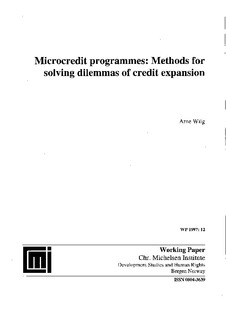| dc.contributor.author | Wiig, Arne | |
| dc.date.accessioned | 2008-03-03T12:09:55Z | |
| dc.date.accessioned | 2017-03-29T09:12:43Z | |
| dc.date.available | 2008-03-03T12:09:55Z | |
| dc.date.available | 2017-03-29T09:12:43Z | |
| dc.date.issued | 1997 | |
| dc.identifier.issn | 0804-3639 | |
| dc.identifier.uri | http://hdl.handle.net/11250/2435913 | |
| dc.description.abstract | Providing credits seems to be an effective tool for improving the welfare of the poor. It is expected that microcredit funding to poor people will expand rapidly over the coming years. If a sound monitoring mechanism is not developed, Wiig argues that such a credit expansion may create unintended negative effects.
Based on a Grameen Bank study, three problems or dilemmas related to credit expansion are analysed: (i) Does a larger supply of microcredit increase the possibility of cross-financing? (ii)
Does capital deepening tend to favour the best ("richest") of the poor? (iii) Does economic success lead to poor repayment behaviour?
Survey methods revealing the extent of these problems are presented. It is argued that some of these methods should be replicated by the implementing agencies to improve the effectiveness of credit provision to the poor. | |
| dc.language.iso | eng | |
| dc.publisher | Chr. Michelsen Institute | |
| dc.relation.ispartofseries | CMI Working paper | |
| dc.relation.ispartofseries | WP 1997: 12 | |
| dc.subject | Microcredit | |
| dc.subject | Poverty | |
| dc.subject | Development banks | |
| dc.subject | Grameen Bank | |
| dc.subject | Bangladesh | |
| dc.title | Microcredit programmes: Methods for solving dilemmas of credit expansion | |
| dc.type | Working paper | |
